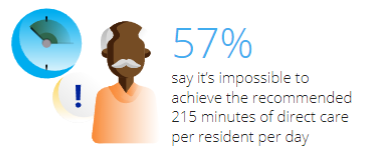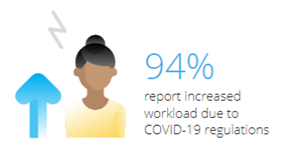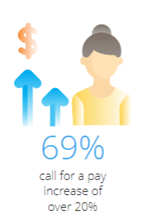The latest Aged Care Workforce Report by CompliSpace reveals that over half of residential aged care workers say that key government reforms are impossible to meet.
.png?width=200&name=ACWR%20Cover%20Image%20BLUE%20(LP%20%26%20Email).png)
According to the 2022 report, Impossible Task: Workers’ Views on the Rising Demands of Aged Care, 57% of aged care workers (or 159,000 people) say that it is impossible to achieve the Government’s proposed mandatory target of 200 minutes direct care time per resident per day.
Here’s what providers need to know about this and other key findings in the report.
About the Report
Impossible Task: Workers’ Views on the Rising Demands of Aged Care is the third of CompliSpace’s annual aged care workforce reports. This year’s report is based on a national survey of 1,110 aged care workers representing more than 300 services (or approximately 11% of the 2,704 services operating in Australia as at 30 June 2021).
The survey aimed to better understand the challenges and needs of Australian aged care workers in relation to the Royal Commission into Aged Care Quality and Safety (Royal Commission), Aged Care Quality Standards, COVID-19, wages and law reforms.
Key Findings
Impossible Task: Workers’ Views on Mandated 215 Minutes Care Time
 The survey asked aged care workers about the feasibility of achieving the Royal Commission’s recommendation of a mandatory 215 minutes of care time per resident per day:
The survey asked aged care workers about the feasibility of achieving the Royal Commission’s recommendation of a mandatory 215 minutes of care time per resident per day:
- 57% say that this is impossible to achieve.
- 39% say that this is difficult to achieve.
- 4% say that this is easy to achieve.
- Victorians are among the most daunted, with 65% of Victorian workers convinced that the 215-minute target is impossible to achieve.
Mass Exodus: 50% of Staff Plan to Leave Within Next Three Years
- 50% of workers (139,000 people) intend to leave the residential aged care industry within the next three years. This includes 23% (64,000 people) who plan to leave within the next 12 months.
- 67% of workers (186,000 people) intend to leave within the next five years.
- The exodus has worsened since last year, with 10% more workers joining the cohort who plan to leave the industry within the next three years, bringing the total up from 40% in 2021 to 50% in 2022.
- Reasons for staying or going remain roughly the same as last year, with stress and pay still the main reasons that workers leave the industry and “relationships with residents and their families” still the main reason that they stay.
New Staff Are Unprepared
- Only 9% of workers describe their new staff as well prepared and only 2% describe them as very well prepared.
- 41% describe new staff as adequately prepared (requiring extra training/supervision but posing no risk to residents).
- 38% describe new staff as unprepared and in need of extra training/supervision to prevent risk to residents.
- 10% describe new staff as so unprepared that they pose a risk to residents even with extra training and supervision.
Significant Gaps in Management
- 45% of workers have lost half or more of their management team within the last 12 months.
- This includes 11% of workers who have lost their entire management team within the last year.
- Losses are heaviest in Tasmania where 59% of workers have lost half or more of their management team in the last year, including 17% who have lost their entire management team.
Increased Workloads Due to Increased Regulation

- 94% of workers experienced an increased workload due to COVID-19 regulations in the last year.
- 85% of workers experienced an increased workload due to the introduction of the 2019 Aged Care Quality Standards.
- These numbers were already high in 2021, with 85% of workers reporting increased workloads due to COVID-19 regulations and 74% reporting increased workloads due to the Aged Care Quality Standards. In 2022, both numbers jumped by 10%.
Adoption of New Technology
- Many in the industry (47%) have adopted new technologies in the past year to make it easier to manage increasing regulatory burdens.
- Experiences with new technology are mixed, with 54% of aged care workers reporting that it has improved the quality and efficiency of their work, 31% saying that it has had no effect and 15% saying that it has harmed quality and efficiency.
- The take-up of new technology by aged care workers varies across Australia, with Canberrans most likely to have done so (75%), followed by Victorians (49%), Western Australians (48%) and South Australians (48%).
Scepticism About Reform
In May 2021 the Australian Government announced a suite of regulatory reforms in response to the Royal Commission. The survey asked aged care workers how they thought these reforms would affect outcomes for aged care residents.
Most workers (79%) have no confidence that the reforms will improve outcomes for residents. This includes:
- 33% who believe that the reforms will have no effect
- 35% who believe that the promised reforms are all talk and will never actually be implemented
- 11% believe who believe that the reforms will make outcomes worse for residents.
Wages Gap
 The Fair Work Commission (FWC) is currently hearing a case to raise the Award wage for many aged care workers by up to 25%. The survey asked workers for their views on an appropriate pay rise:
The Fair Work Commission (FWC) is currently hearing a case to raise the Award wage for many aged care workers by up to 25%. The survey asked workers for their views on an appropriate pay rise:
- 69% believe that they should receive an annual pay increase of more than 20%
- this includes 47% of workers who believe that the pay rise should be more than 25%.
Request Your Copy
CompliSpace’s Aged Care Workforce Report, Impossible Task: Workers' Views on the Rising Demands of Aged Care, is now available for download. To see the Report’s full findings, visit complispace.com.au/workforce-report-2022.




.png?width=200&name=ACWR%20Cover%20Image%20BLUE%20(LP%20%26%20Email).png)





